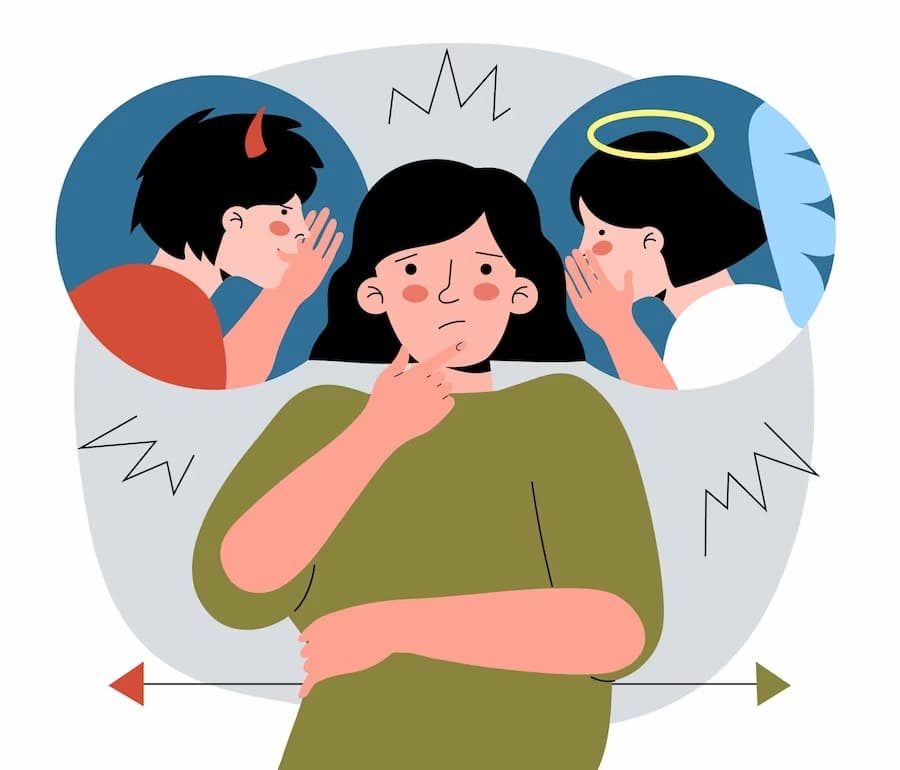Rational Emotive Behaviour Therapy (REBT) is a type of therapy given by Albert Ellis that helps to identify irrational beliefs and illogical thoughts that may lead to several emotional and behavioural issues. These patterns are identified in the sessions and replaced by rational thought patterns. It assumes that people contribute to their own problems and the associated psychological and distressing symptoms due to the irrational core beliefs that people have in their mind.
Table of Contents
ToggleOne’s core beliefs create the emotions and influence the evaluations and interpretations of the behaviours in real life situations. In the therapeutic process, clients learn to replace irrational thoughts with rational ones. The focus is always on thinking and acting and learning strategies and new skills that are required in daily life.

How Rational Emotive Behaviour Therapy works?
The main aim is to minimize the emotional disturbance and negative thoughts and feelings and thus increase the quality of life. With the help of the therapist, clients can differentiate between realistic and unrealistic thoughts, emotions and behaviours and change them into healthy thoughts, emotions and behaviours. The clients engage in irrational beliefs and use terms like “shoulds”, “musts” and “oughts”.
Therapist teaches clients how to manage their self-defeating beliefs and replace these terms with rational ones. Thinking is modified and irrational core beliefs are minimized. These beliefs are always challenged to reduce their validity and people try to avoid becoming the victim of their own negative thoughts and emotions. The fear and anxiety that emerges due to illogical thoughts are managed in the therapeutic process. When people accept that they underpin their emotions and behaviours they are able to participate in the cognitive restructuring process. Clients are made to apply logical thought and do homework as well.

Techniques of Rational Emotive Behaviour Therapy
All the techniques are put under categories:
Techniques in Cognitive Behavioral Therapy
The main aim in Cognitive Behavioral Therapy is to identify the connection between thoughts, emotions and behaviors and how they influence each other.
1. Cognitive Techniques
In REBT, therapists use variety of cognitive techniques in a direct manner with the clients. This therapy is heavily dependent on thinking, explaining, interpreting, analysing, understanding and disputing. So, this therapy helps to change the existent maladaptive ways of thinking. Some of the cognitive techniques are as follows:

A. Dealing with irrational beliefs
The main of this technique is to dispute the client’s irrational beliefs and helping them to challenge these beliefs and their logic behind it. Clients are taught how to get over the use of “musts” and “shoulds” and let go of any irrational fear and thought that they have which doesn’t have any logical evidence. For example, if a client has an irrational belief that “If I doesn’t get this job then I am a failure”, so the therapist will help the client to firstly teach the meaning of failure and how one aspect of life doesn’t measure one’s failure and success of life in general.
Therapist gives a challenging questions worksheet to the clients so that they can recognize and then question their irrational beliefs like:
- Nothing good ever happens to me.
- If I doesn’t get this job then I am a failure
- I am always right.
- I should do everything otherwise I am useless.
And then challenge them with questions like:
- What is the evidence behind this thought?
- Is there any cognitive distortion involved in this thought?
- I am using words like “musts”, “shoulds”, “always”, “never” and “can’t”.

B. Exposing to fearful situation
It is the most effective treatment for the disturbing thoughts and emotions. It helps in encouraging clients to face their fears and anxiety is experienced to cope with it. Client’s tolerance is increased for the situations or events that are perceived as stressful. Client will be exposed to a situation for a long time and on frequent intervals. Client’s progress in sessions and in outside world is tracked regularly and feedback is given on how to improve to deal with any difficulty. Therapist also accompanies the client if needed like the fear level is extremely high and client needs some support. Client’s maladaptive responses are replaced with rational and adaptive responses.
C. Reframing
In this, unhelpful thoughts are managed by changing them as they are not beneficial. It involves shifting mind-set of any situation, person or an event so to change the perspective to a healthy one. The main idea behind this technique is to change the frame from which anything is interpreted so that behaviour gets changed in a healthy way. It helps the clients in validating their emotions and allows oneself to feel compassion for themselves.

D. Homework
The client makes a list of all the problems and associated irrational or illogical beliefs and then work on disputing those beliefs. When this homework is done by the client then all the negative self-talk patterns are identified. A-B-C model is also used to identify the antecedents, beliefs and consequences of a problematic behaviour. Therapist teaches several required skills to the client and with the help of this homework the client shifts the learning from the session to everyday life. Homework also helps in keeping a track on the progress of the client throughout the process of Rational Emotive Behaviour Therapy.
2. Emotive Techniques
In these techniques, the main focus is on the client’s distressful feelings and how it influences behaviour and thoughts. So, any maladaptive patterns are recognized and then managed properly. These techniques are vivid and evocative in nature.
A. Using Humor
Rational Emotive Behaviour Therapy assumes that disturbances in emotions and thinking of people arises when they take themselves too seriously and that’s why they need some humor in their life to tone down the seriousness. It also helps in putting every aspect of life into a perspective. Instead of getting scared and experience distress, humor helps in relaxation and staying positive. It keeps one’s problems solving and decision making skills really effective.

B. Rational Emotive Imagery
It is an intense technique so it should be employed carefully in the session by REBT Practitioner. In this, clients have to imagine the situation regarding which they have developed their irrational belief. For example, if someone thinks that “I always fail in maths exam”, so they have to imagine this situation and also experience the feelings.
With the help of the therapist, clients train themselves to how to cope with a stressful situation. This technique can be applied to any kind of situation that is problematic for someone. Overtime, clients stop feeling disturbing emotions and thus can go through that situation without feeling anxious.
C. Role playing
Through role playing technique, clients enact their problematic situation in the therapy session thus therapist is able to notice any emotional and cognitive disturbances and also train them what they can do to remove these disturbances. Clients rehearse and enact the suggestions again and again told by the therapist till they are trained completely to do the same in real-life situation. Again the focus is on the irrational beliefs which are causing negative emotions in an individual.
For example, if a person is scared of public speaking then the person can just imagine speaking to a large crowd and practice speaking in that situation which can overtime increase self-esteem and confidence levels.

D. Shame-attacking exercises
When the emotional disturbance is related to self, it can lead to anxiety, shame, guilt and depression. So, Shame-attacking exercises helps in reducing these feelings of shame and guilt. The simple technique is to correct the cognitive distortion of catastrophizing because if the person thinks that something bad happened to me is not catastrophic then negative feelings won’t even occur. It helps in enhancing self-acceptance, responsibility and maturity.
Clients are taught to work on themselves so that they don’t feel humiliated because of their own judgments for themselves. Eventually, they also train themselves so much that no situation affects their self-esteem.
3. Behavioural Techniques
Many REBT Practitioners use behavioural therapy techniques in therapy sessions that can be easily carried out in everyday life situations.
A. Relaxation
The unwanted and negative beliefs and emotions can lead to anxiety and stress in everyday life of an individual. Relaxation techniques are proven to be really effective for managing stress or anxiety. It is a habit that takes time to develop and after that results can be seen. It not only helps with everyday stress but also long-term stress or stress due to health problems. When tension or stress is getting out of control, then relaxation techniques comes to the rescue as it helps in thinking positively, solve problems efficiently and make right decisions.
Various types of relaxation techniques are:
- Deep breathing
- Yoga
- Aromatherapy
- Meditation
- Massage

B. Hypnosis
There is a technique called Cognitive Hypnotherapy which takes into consideration all the aspects like emotional, psychological and behavioural. It mainly focuses on the hidden thoughts and beliefs which influences the main core beliefs and thus emotions and overt behaviour. As every behaviour has an intention so every behaviour has a hidden belief associated with it which sometimes is deep rooted in unconscious but can be revealed through cognitive hypnotherapy. But also every human is different so this approach is modified for every person coming to seek cognitive hypnotherapy. Thus, according to the problem every client gets a personalized treatment plan.
C. Mindfulness
Critical Evaluation of Rational Emotive Behaviour Therapy
Rational Emotive Behaviour Therapy helps in noticing thoughts that are self-defeating and question their rationality. It is very easy accessible to everyone and can be used with a wide variety of populations. Also, it works with thoughts that are distinctive and unique. This therapy is even scientifically proven and it has been proved that it cures many psychological problems like depression, stress, anxiety, insomnia, overthinking, sexual problems, etc. but it is not much effective for schizophrenia and other personality disorders. Many other therapies focus on past memories and experience, rational emotive behaviour therapy just focuses on present moment.
Sometimes, therapists have to be harsh and rude as this therapy involves challenging the beliefs of clients. It is not an easy task to undergo REBT as it takes willingness and a lot of dedication to change existing thinking patterns and make new ones. But also, it provides long-term effectiveness and requires only few sessions.

Seek professional mental help at Medavas
If you engage in overthinking and negative/irrational thoughts then you can seek Rational Emotive Behaviour Therapy at Medavas from experienced psychologists/therapists who can really help you. Psychologists/Therapists available at Medavas are trained and specialized in the field of Rational Emotive Behaviour Therapy. They have a lot of experience in using the techniques of Rational Emotive Behaviour Therapy. It is a very smooth and an easy process to book the session at Medavas in various modes like instant chats, audio calls and video calls. So, quickly book the session and avail the opportunities at Medavas.
Frequently Asked Questions (FAQs)
Where Rational Emotive Behaviour Therapy can be applied?
Rational Emotive Behaviour Therapy is applicable in a variety of settings and population. It can even be applied in couples counselling and family counselling. It can be used in schools, hospitals, clinics, rehabilitation centres, de-addiction centres, offices or can even be done at home at personal level.
For what issues Rational Emotive Behaviour Therapy can be used for?
It can be used for a variety of issue like depression, anxiety, addictive behaviours, phobias, panic attacks, procrastination, anger issues, eating disorders, sexual disorders and sleep problems.
Does meditation helps in Rational Emotive Behaviour Therapy?
Yes, Meditation is really effective in REBT as it brings calmness and relaxation in the therapy session when the client feels anxious. It helps in developing a peace of mind and happiness.

